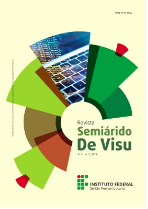O Grotesco e a velhice no conto “A procura de uma dignidade”
Visualizações: 1151DOI:
https://doi.org/10.31416/cacto.v1i1.277Keywords:
Grotesque, Old age, Tales, Sublimation, DisturbanceAbstract
The present work proposes to point out the presence of the grotesque in the tale "The search for a dignity" contained in Clarice Lispector's book Where You Were at Night (1974). According to Almeida (2004), at the time of its release this work was unanimously linked by critics to the theme of Surrealism, and the author Clarice Lispector has always sought much more an experimentation with language than a perpetual bond with fashions or trends. So much so that Lispector has never been directly linked to a school. Moreover, Roncador (2002) states that there are some differences between the initial and the final production of the writer, in this case, we are interested, above all, in the introduction of sublimated elements in her ultimate writing, because such elements cause a certain discomfort and a disturbance. In the short story "The search for a dignity", for example, the grotesque is realized through her main character, Mrs. Jorge B. Xavier who is ashamed to feel a strong sexual desire for the singer Roberto Carlos, because the erotic present in the old character is understood as indecent. However, to speak of grotesque also demands to deal with sublime, because for many years we have understood sublime and grotesque as aesthetic opposites because of the theme and the aesthetic effects developed by each one of them, for example, the sublime is part of an art that cultivates a pattern of beauty (balance, light, good) to the point of renouncing and sublimating its opposite, presented as the ugly (the deformed, the shadow, the evil) that is privileged by the grotesque and that in this article will be rescued.
References
ALMEIDA, Joel Rosa de. A experimentação do grotesco em Clarice Lispector: ensaios sobre literatura e pintura. São Paulo: Nankin Editorial, Editora da Universidade de São Paulo, 2004.
DELEUZE, Gilles e GUATTARI, Félix. Kafka: por uma literatura menor. Lisboa: Assírio e Alvim, 2003.
DINIS, Nilson. A arte da fuga em Clarice Lispector. Londrina: Ed. UEL, 2001.
FOUCAULT, Michel, As palavras e as coisas: uma arqueologia das ciências humanas.
Trad. Salma Tannus Muchail. 8ª ed. São Paulo: Martins Fontes, 1999.
KAYSER, Wolfgang Johannes. O grotesco: configuração na pintura e na literatura. Trad. J. Guinsburg. São Paulo: Perspectiva, 2009.
LISPECTOR, Clarice. Água Viva. Rio de Janeiro: Rocco, 1998.
LISPECTOR, C. “A partida do trem”. In: Onde estivestes de noite. Rio de Janeiro: Rocco, 1999. p. 19- 35.
LISPECTOR, C. “A procura de uma de uma dignidade”. In: Onde estivestes de noite. Rio de Janeiro: Rocco, 1999. p. 9-18.
LISPECTOR, C. A via crucis do corpo. Rio de Janeiro: Rocco, 1998.
LISPECTOR, C. Onde estivestes de noite. Rio de Janeiro: Rocco, 1999.
LISPECTOR, C. “O relatório da coisa”. In: Onde estivestes de noite. Rio de Janeiro: Rocco, 1999. p. 57- 64.
MORAES, Marcelo Jacques de. Georges Bataille e as formações do abjeto. Outra travessia. Revista de Literatura, Ilha de Santa Catarina, n. 5, p. 107-120, jan, 2005.
RONCADOR, Sônia. Poéticas do empobrecimento- A escrita derradeira de Clarice. 1ª ed. São Paulo: Annablume, 2002.














